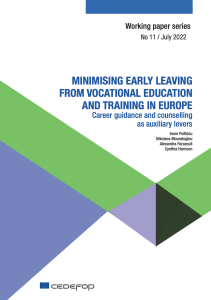Minimising early leaving from vocational education and training in Europe: career guidance and counselling as auxiliary levers

This report maps the existing career guidance and counselling policies and practices supporting learners at risk and early leavers from vocational education and training in the 27 EU countries plus the UK.
It analyses the key characteristics of these policies and practices, identifies emerging trends and common partners in general education and VET, and identifies information and data gaps.
A key conclusion of the study is that successful approaches for the effective support of both early leavers and those at risk of abandoning their studies should be based on:
(a) a comprehensive strategy in which career guidance and counselling should be integrated components and actions of policies and practices aiming to counteract ELET
(b) strong multi-stakeholder collaboration so that different services and professionals may address individuals’ diverse needs based on the former’s qualifications and training. Involving stakeholders from either regional, local or provider levels allows for the contextualisation of broader challenges reflected in national systems, policies and measures for tackling ELET;
(c) a mixed approach where generic career guidance and counselling are accompanied by individualised supporting measures to effectively address the diverse needs of individuals; and
(d) a case management approach that encourages collaboration with other services and professionals, including individuals’ families and peers, to cope with complex needs.A key data gap identified was the lack of evidence of systematic monitoring and impact evaluation of policies and practices supporting learners at risk and early leavers in Europe, to prove the effectiveness of career guidance and counselling policies and practices or similar measures.





